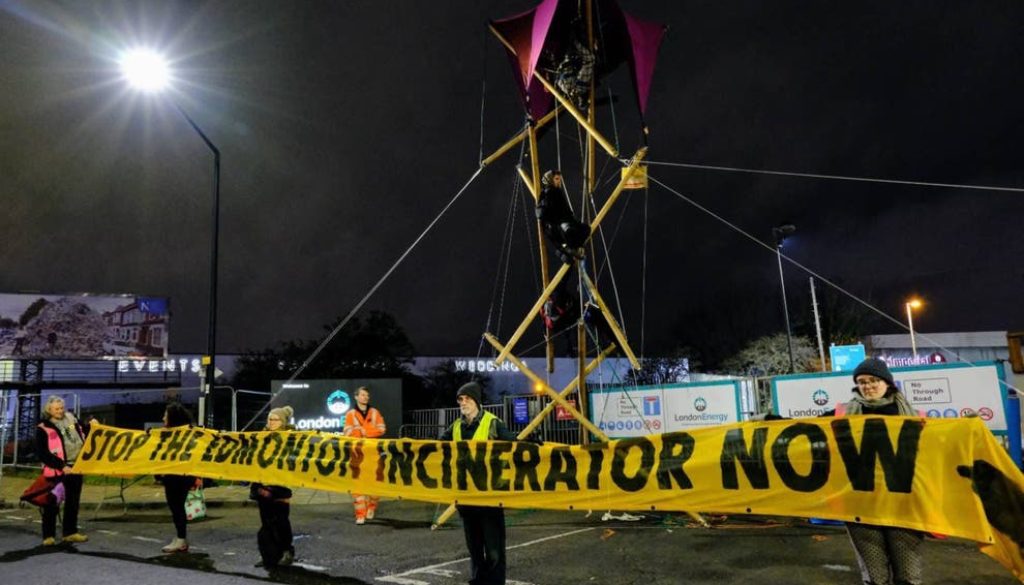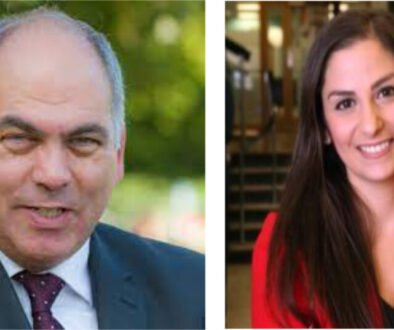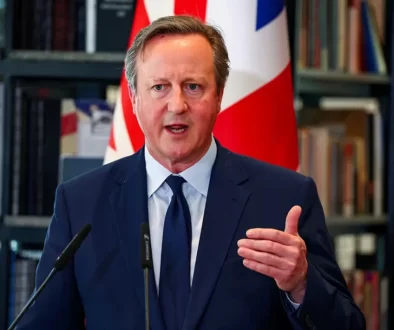Local Cypriots say NO to the expansion of the Edmonton Incinerator

In view of the available data the continued operation and planned expansion of the Edmonton Incinerator, euphemistically renamed at some stage as EcoPark or Edmonton EcoPark or London Ecopark, is in our opinion a crime against humanity.
Protests against its expansion were still going on today (16/12/21) while seven councils in north London were expected to vote for a contract to be awarded to rebuild and expand the capacity of the Edmonton incinerator, run by the North London Waste Authority (NLWA), by 200,000 tonnes.
The Edmonton Incinerator sits in one of the poorest areas in the country, where 65% of the residents are from ethnic minority backgrounds and air pollution already breaches legal limits. Members of the Cypriot Community in the borough had shared posts on social media calling for more people to join the protests.
Last Monday morning two people were arrested after Extinction Rebellion protesters demonstrated at the Edmonton Incinerator. XR activists descended on the Edmonton EcoPark Incinerator shortly before 6am in protest over a planned expansion of the site.
The protesters arrived at the site in the early hours to protest what they called the “environmental racism” of burning more waste to produce energy.
WHAT’S GOING ON?
The 7 North London councils (Barnet, Camden, Enfield, Hackney, Haringey, Islington, and Waltham Forest) have decided to build a new incinerator in Edmonton, which will burn rubbish day and night for the next 50 years. It will be 30% bigger than the old incinerator, far exceeding the needs of North London. Since it will be too big, waste will need to be shipped in from outside the 7 boroughs, adding to traffic congestion and pollution.
WHY OPPOSE THIS PLAN?
The North London Waste Authority is building the new incinerator and claims it is safe. But according to scientists and doctors, it will pollute the air residents breathe with toxic substances and particles that are known to damage human health, and especially children’s health.
The residents of Edmonton and the surrounding areas are already suffering from high levels of pollution. What they really need is cleaner air.
The new incinerator will also send a vast amount of greenhouse gases into the atmosphere. These gases are already causing dangerous changes to the climate. In order to prevent a climate catastrophe, we need to cut down on greenhouse gases, not add to them.
This massive, unnecessary incinerator complex will cost £1.2billion and will be paid through council taxes. The residents of North London have nothing to gain from it but will have to pay for it for many years to come.
Modern technologies can recycle and compost the vast majority of this waste, and the small amount that is left over can be sent to London’s existing incinerators. The North London Waste Authority is refusing to invest in these modern facilities, even though they would create many more jobs than the incinerator.
Only days ago, MPs had called for a moratorium on the expansion of new waste incineration plants. A report by the all-party parliamentary group on air pollution says expansions should be halted immediately to protect human health and cut carbon emissions.
The report concludes that ultrafine particles released by incineration at scale constitute a significant health hazard. Geraint Davies, Labour MP and chair of the group, said the expansion of the Edmonton incinerator and others should be stopped.
“Air pollution already kills 64,000 people across the UK each year, so government planning that will double incineration capacity by allowing the construction of 50 new waste incinerators by 2030 … should be immediately halted as it will give rise to a significant growth in ultrafine particulates, which are the most dangerous to human health,” he said.
“Of critical importance is that it is the number of particulates, as opposed to their combined mass, that is the key determinant for human ill health. The smallest particulates act like a gas and penetrate seamlessly into the blood stream and organs, creating damage to the hearts, brains, and lungs of victims.
There are at least 90 incinerators in the UK and 50 more proposed or in development, according to government data and data collected by the anti incineration group United Kingdom Without Incineration Network (Unwin).
The group of MPs heard evidence from Ruggero Ridolfi, an oncologist with more than 40 years of clinical experience, who found heavy metals in the toenails of children living near incinerators and highlighted the link with acute childhood leukaemia.
Research by Kirsten Bouman, of ToxicoWatch, an independent non-profit organisation dedicated to raising awareness of toxic hazards, found dioxins in chicken eggs up to 10km from incinerators that emit them.
The report was published days before seven councils in north London will be asked to vote for a contract to be awarded to rebuild and expand the capacity of the Edmonton incinerator, run by the North London Waste Authority (NLWA), by 200,000 tonnes.
Protests against the Edmonton incinerator include demonstrations by doctors in the area who are calling on council leaders to support cleaner, alternative ways of dealing with local waste. Recycling rates in north London are just 30% and more than half of the incinerated waste is readily recyclable, according to Defra.
Dr Ed Tranah, medical registrar at North Middlesex hospital, said: “If this goes ahead you are looking at 35-50 years of continued incineration of waste, much of which does not need to be incinerated and is recyclable.
“We are burning all sorts of materials and we don’t even have a study into how the fumes are affecting people working and living in the area.”
Haringey council recently called for the expansion to be paused citing concerns over air pollution.
A recent report from the National Infrastructure committee warned rising greenhouse gas emissions from waste incineration would prevent the UK meeting its net zero targets by 2050.
Highlighting the carbon impact of waste incineration, the APPG report called for tax measures to be introduced to restrict incinerator expansion.
Dr Dominic Hogg, who founded the environmental consultancy Eunomia, told the MPs a 700,000-tonne incinerator pumps out about 700 tonnes of NOx (nitrogen oxides) a year. He said incineration – like landfill – should be taxed in relation to the carbon content of the feedstock and the emissions of NOx, SOx (sulfur oxides), particulate matter and other pollutants. They should also be part of the emissions trading scheme.
Davies said poorer communities already suffered worse health outcomes from disproportionately higher levels of air pollution and inequality.
Recent research by Greenpeace showed poorer communities were three times more likely to have an incinerator in their area than more affluent areas.
Mr Peter Droussiotis
Mr Peter Droussiotis, former President of the National Federation of Cypriots in the UK, commented: “Unfortunately, it is always the most vulnerable whose voices are heard last. I know that there is opposition to this within Haringey Council too. I hope that reason will prevail”.



Yes. The Cypriot councillor in Enfield did not comment on the Enfield vote . Sadly .